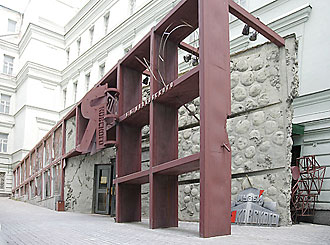|
More than any other writer, Vladimir Mayakovsky embodied the hopes, aspirations and eventual degeneration of the political and cultural ideals that spurred the 1917 revolution. Born in 1893 in Georgia, he moved with his family to Moscow as a teenager, and became involved in radical politics while still a gymnasium schoolboy.
His part in meetings and demonstrations led to several arrests and his eventual incarceration in Butyrskaya Prison, where he began to write verse.
He became a disciple of Futurism and a controversial figure in pre-revolutionary avant garde circles in Moscow and St Petersburg. Unlike the majority of his contemporaries, he embraced the Bolshevik seizure of power unreservedly and threw all his energies into the drive to create a new art for the proletariat. A competent and innovative graphic artist, he was as enthusiastic in creating propaganda posters promoting personal hygeine as in composing exhleratingly passionate love poetry. His charisma and emotional sincerity made him unique in his ability to captivate a factory shopfloor with verses that retained a dizzying linguistic and structural complexity.
His suicide in 1931, prompted by despair at his inability to adapt to the increasingly restrictive boundaries placed on art by the Bolshevik high command and to curb his irrepresible individualism, came to symbolize the end of the great, doomed artistic experiment of the 1920s.
Nonetheless, his reputation as the Bard of the Revolution remained untarnished, and his more bombastic political poems were an integral part of the literature syllabus for Soviet school children right up to the fall of the Soviet Union, providing a secret path to genuinely subversive poetry for scores of dissident intellectuals. He was also one of the few Soviet artists who gained significant recognition in the West, an inimitable inspiration to generations of left-wing artists trying to combine artistic integrity and passion with political engagement.
|

 This imaginative and exciting museum is dedicated to the life and works of Vladimir Mayakovsky, one of the most colorful figures of the Revolution and arguably Russia's greatest 20th Century poet.
This imaginative and exciting museum is dedicated to the life and works of Vladimir Mayakovsky, one of the most colorful figures of the Revolution and arguably Russia's greatest 20th Century poet.